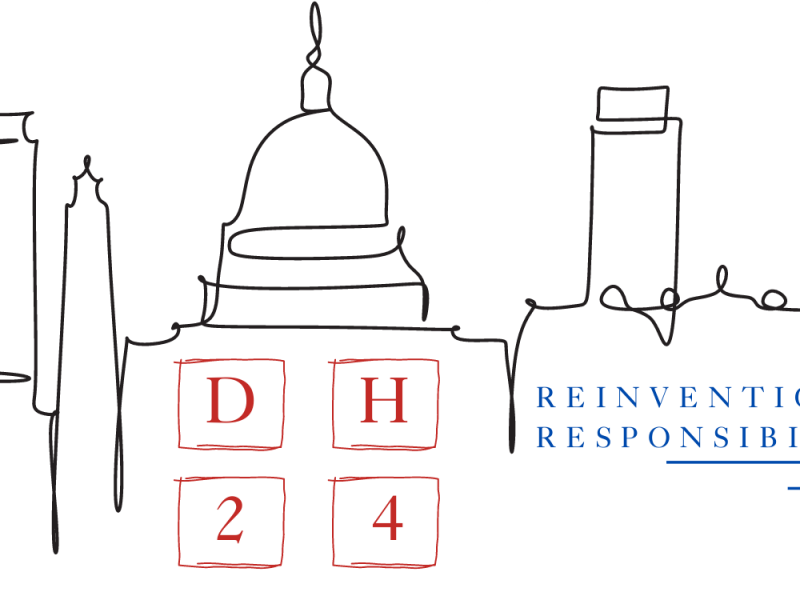DH2024 in Washington, D.C.
TCDH-Beiträge auf der DH2024

Datum:
05.08.2024 bis 09.08.2024Ort:
Arlington, VA campus, in Washington, D.C.
Bis zum 27. Juli besteht die Möglichkeit, sich für eine Online-Teilnahme zu registrieren.
Kategorie(n):
TagungKontakt:
Prof. Dr. Christof SchöchSoftware development begins when the code is complete: Lessons learnt from the development of Pydistinto
Vortrag von Keli Du im Rahmen der DH Mini-conference „DH Inside Out” at DH2024.
5. August, Session 4, 3:20 – 3:40 PM EDT in Van Metre Hall 118.
A Computational Exploration of the Narrative Functions of Poetry in Chinese Qing Vernacular Fiction (1644-1911)
Eine Kurzpräsentation von Keli Du und Rongqian Ma.
7. August 2:00 – 3:30 PM EDT in Van Metre Hall 118.
This paper presents a pilot study exploring the narrative functions of poems embedded in Chinese Qing vernacular fiction (1644-1911). Analyzing a large corpus of Qing fiction, we identified five narrative functions of the embedded poems and tested the feasibility of applying computational models to classify poems based on their functions.
Literary Methods for All: CLS INFRA – Unlocking a World of Words!
Ein Poster von Christof Schöch, Iuliia Dudar, Evgeniia Fileva, Julie Birkenholz, Ingo Börner, Joanna Byszuk, Vera Maria Charvát, Silvie Cinková, Tess Dejaeghere u.a.
Die Poster Session I findet am 7. August von 6:00 PM – 7:30 PM EDT in Van Metre Hall 125 statt.
Unlock the Power of Literature in the Digital Age with EU-Funded Computational Literary Studies Infrastructure (CLS INFRA)! We are helping to build the shared and sustainable infrastructure needed to reinvent approaches to existing data, tools, and knowledge, revolutionizing the study of Europe’s multilingual literary heritage. Working within the FAIR and CARE principles (Wilkinson et al. 2016; 2019; Carroll et al. 2020) we are standardizing, aligning resources, and widening access for researchers everywhere. The aim is to build on recently-compiled high- quality literary corpora, such as DraCor and ELTeC (Fischer et al. 2019; Schöch et al. 2021; Odebrecht, Burnard, and Schöch 2020), and tools e.g. TXM, stylo, multilingual NLP pipelines (Heiden 2010; Eder, Rybicki, and Kestemont 2016), demonstrating how they can be used by academics and non-academics engaged with all kinds of textual analysis. In the proposed poster we will present the recent achievements and deliverables of the CLS INFRA projects, focusing specifically on the tools and information that make CLS methods accessible to all. Let's create new insights into our diverse European cultural tapestry together! Presenter: Maciej Eder.
Shifting Sentiments? What happens to BERT-based Sentiment Classification when derived text formats are used for fine-tuning
Eine Präsentation von Keli Du und Christof Schöch.
8. August 10:30 – 12:00 PM EDT in Van Metre Hall 113.
In response to copyright law restricting Text and Data Mining, derived text formats (aka extracted features) were proposed. This work shows that selectively reducing information in DTFs has minor negative impact on DistilBERT-based sentiment classification. Therefore, it is useful to publish copyrighted texts in DTFs, e.g. for fine-tuning LLMs.
“Libération des données”: An open science approach to the curation and analysis of the XVIIIe siècle: bibliographie
Eine Kurzpräsentation von Christof Schöch.
8. August von 4:00 PM – 5:30 PM EDT in Van Metre Hall 134.
This contribution showcases the XVIIIe siècle: bibliographie, provides insight into strategies for the open curation of bibliographic data into a standards-based dataset, highlights key findings about the publication habits in Eighteenth-century studies, all while making the process as transparent as possible and providing data and code on a website: https://christofs.github.io/BIB18/.
Exploring Fictional Critique and Literary Evaluations
Ein Poster von Benjamin Gittel und Gesa Bei der Wieden.
Die Poster Session II findet am 9. August von 2:00 PM – 3:30 PM EDT in Van Metre Hall 125 statt.
My contribution aims at identifying on the one hand ascriptions of fictional critique (like social critique, critique of contemporary affairs or cultural critique) by literary critics and on the other hand textual correlates of such “fictional critique” that are meaningful to literary scholars. Presenter: Benjamin Gittel.

